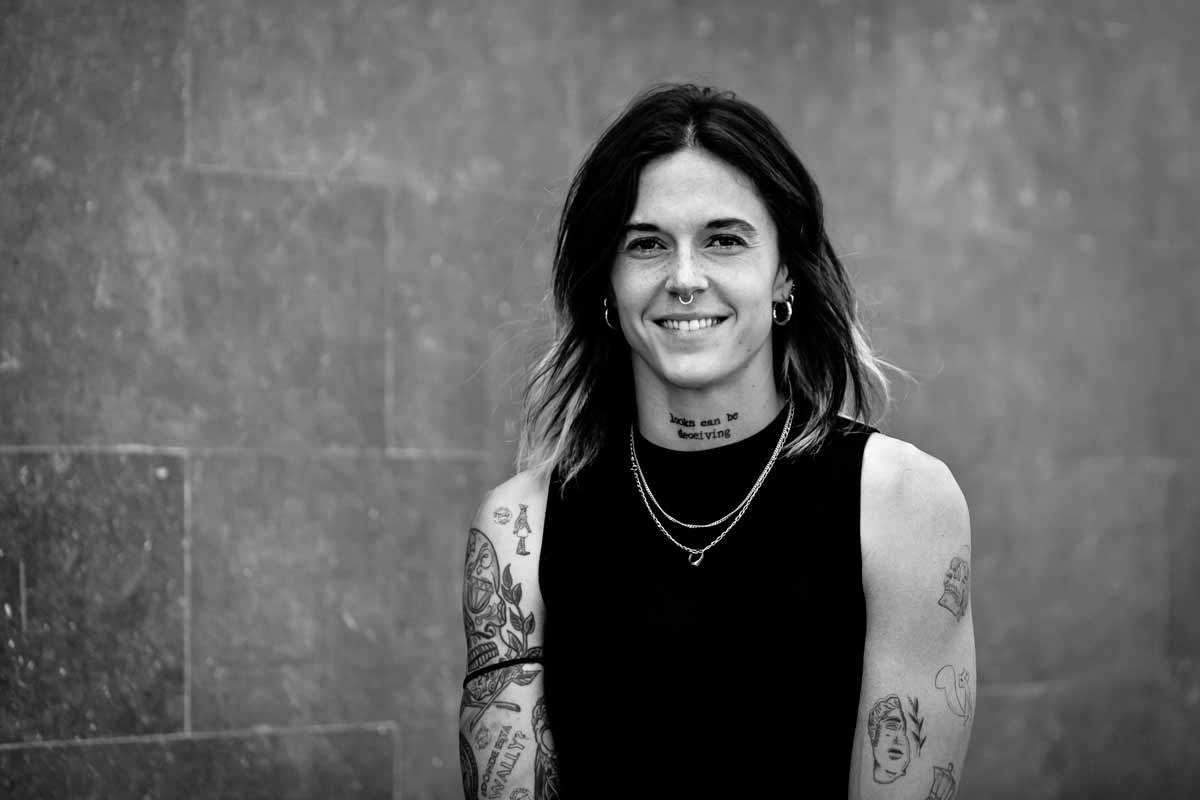
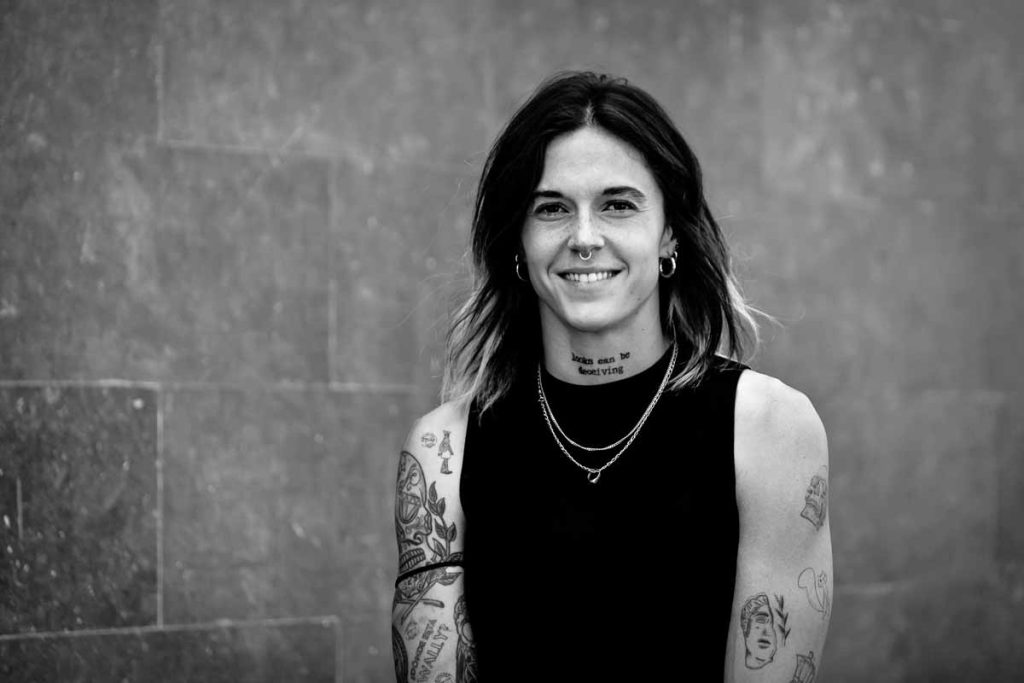
This article was written in collaboration between Tarek Nacer, Muhammad Arham Ansari, Omar Hawwash, Joav Pedraza, and Jordi Besosa.
Today is María Pilar León Cebrián’s birthday, and for that, we decided to gift her and the fans of the best center back in the world the translation of the latest Mapi León interview which was on June 12, 2023, with Jot Down Sport, interviewed by Andrea Menéndez.
On her €50k price tag, and being the first Spanish women’s player to transfer from one club to another:
“It doesn’t weigh on me. Partially, it actually strengthened me. It helped me feel more valuable. I was playing at Atléti, things started going well, I went to [join] the national team. Ultimately, when things start to improve, your ambitions do, too. Because, previously, I would get picked for the national teams’ reserves, but then not get called upon when it was matchday. In fact, it was only once, when we were in Azerbaijan, against them and two other weak teams, and I only played against the weakest side of the three. At the time, people who weren’t even in my position, got the nod ahead of me.”
“I used to play as a left-back, and when you’re playing out wide, you have more pressure on you, and it’s best to be left-footed [as a left-back]. Right-footed players played ahead of me in that position, and they were good, but when you’re at a similar lelvel… and the coach decides to put a ‘wrong-footed’ player there, it gave me a lot of insecurities. When I got the offer from Barcelona, it reinforced me [and the belief I had in myself]. Throughout my career, up until this level, I’ve always had doubts in terms of my capabilities.”
“When I was 7 years old, I played volleyball, and being a girl with good coordination, you could play in various types of sports, because it goes in your favor [given your abilities], more or less. I understand that the coach would’ve told me [something like] “hey, you’re very good, why don’t you stay with us?”. With something as simple as that trust, you could change the future or the career of that kid. What if I opted for volleyball [instead]?”
“Later, I chose football, and that year I was going to play with the Aragonese national team. There, I knew one of the women’s futsal coaches in Zaragoza. They presented me with the opportunity to trial for the Transportes Alcaline because I had met David Magaña in a grocery store, and there, the famous anecdote of him signing me on the spot, happened. Because of this, I chose to play full-pitch football, coming from having played futsal. It was easy for me to play with a group of girls I already knew through the Aragonese futsal national team, but I went from what I knew [and had done], to just doing something that simply appealed to me [playing football with 11 on the pitch].”
“Well, doubts from my entourage arose: we don’t see you playing full-pitch football, you’re good at futsal – with no bad intentions. But again, they tried to condition me [to do certain things], while I was a kid. I was 13 years old, and the whole time, people who were in charge of my training and grrowth, were planting doubts with regards to the decision I wanted to make.”
“I made it to full-pitch football, and when Espanyol wanted to sign me, Alcaine also planted some doubts: let’s see if they sign you, if you get paid.”
So that you didn’t leave.
“Of course! But you are telling that to a girl who is going to turn 17 or 18. Are you aware of how it can affect her? I didn’t want to leave for another reason, what I wanted was to continue growing and improving.”
“I wanted to leave Zaragoza because I saw that I was stagnating. I had been at the club for four years, two with a third-team contract and due to an injury I later began to play with the second team and even with the first team for some games. I was lucky to move up quickly because left-footed players were needed, I went from a contract with the third team to a first team contract.”
“I wanted to improve. And I have never told this because there are no in-depth interviews, but I was in the first division at Zaragoza, and I understand that things have changed a lot, I used to earn 150 euros. When I got the offer from Espanyol it was much more than 150 euros and they did offer me more money. I have nothing against them and I know those were different times, and it should be noted that in Zaragoza there was a girls’ team, and it continues to have a girls’ team, despite the fact that Real Zaragoza has never supported it, and this is very valuable. If it hadn’t been for Alcaine, there wouldn’t have been a women’s football team in Zaragoza, and that’s how it is.”
“In the end, what they have done is something very important. At no time do I want it to seem like I’m not grateful, because I had a place to grow up. But you have to be very careful with what you say to people and even more so when they are so young, because of how you can influence them, because when you have lived through all these things and they have constantly generated doubts about your level, the fact that a club like FC Barcelona wants to pay 50,000 euros to sign me, it strengthened me a lot as an athlete.”
“I don’t think about [knowing my worth]. I told Carlos [Rodriguez, Mapi’s agent]: You’re freaking out, I don’t know what you took before speaking to me, but calm down.”
“I never thought they [Barcelona] would pay. I’m not the striker that scores goals, and in Spanish football, no one ever paid for a signing. How would they pay 50.000 euros for a center-back, who had also only been a center-back for a year? He told me to have faith.”
“I didn’t believe him, and when it happened, I was like… damn. And of course, once we got there, and they had paid, I had to repay their trust. I had to show them that I was worth what they paid [for me].”
They got off the hook easily.
“Do you think so? I didn’t feel the pressure at any moment. There was, but it was a good kind. It is true that since I am so competitive I always thought about: I’m going to do it, but to win the position.”
The first tattoo she got done says “It’s possible”, was it possible that a girl from Zaragoza who played volleyball could become the best central defender in the world, according to FIFA?
“No. Let’s talk about it… it is possible because it has been done. At no time did I think it would happen. Just like a seven-year-old boy who could dream of being a footballer.”
But it’s not being a footballer, it’s being the best central defender in the world.
“Well… those are your words.”
“I’ve played a lot of Champions League matches in another country. When it comes down to it, a lot of people that follow women’s football see me here a lot, but when I go to other countries, it really fires me up to think ‘I have to show the country or this club that definitely haven’t seen me before who Mapi León really is.’ That’s the motivation I have. That’s my personal challenge, aside from doing well and winning, that too without the game going poorly. Because if that happens, it wouldn’t do any good for me to stand out, we’re talking about Barca here.”
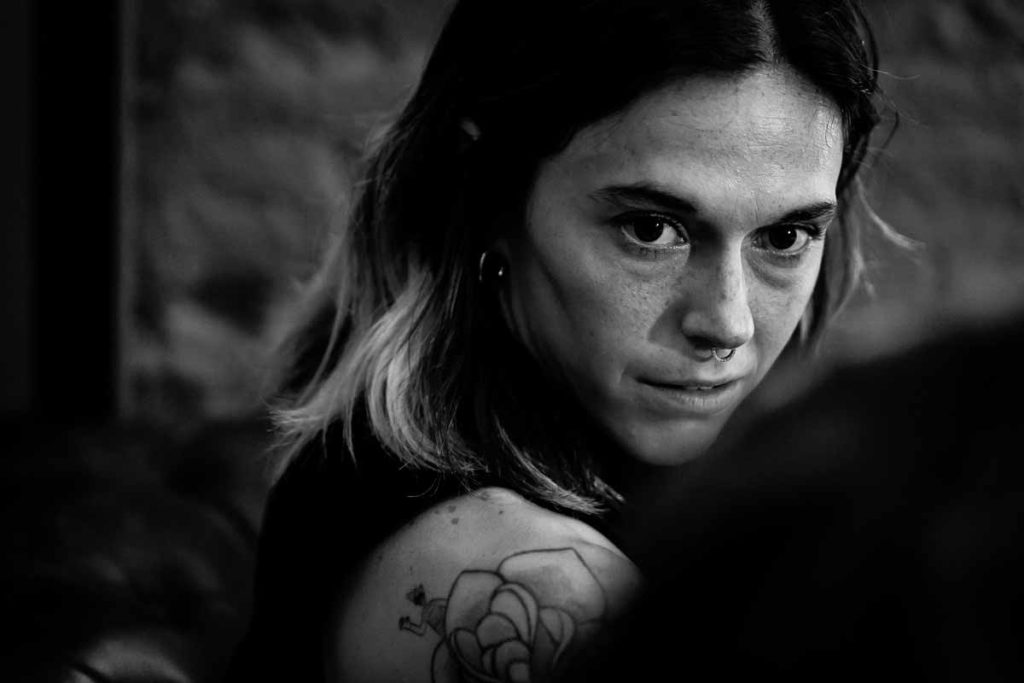
“Despite being a center-back, I can be one of the best players in each game, whether it’s because I’ve defended well, gotten close to their 18-yard box, assisted a goal from a corner… those are my personal challenges. That’s also what motivates me: that people leave the stadium going “[look at] how well Mapi León did.”
“If it weren’t for Sara Sanaú, a player from the Ultimate Móstoles in the Queens League, she wouldn’t have made her debut.”
“If he hadn’t given me her cleats, I forgot them at home, I wouldn’t have been able to play. Well, I hope one of my teammates would have given me theirs.”
Before you talked about Zaragoza and Espanyol. Many of your teammates from back then didn’t make it, are there any that you miss in the elite?
“I don’t know if they could have made it or not, that in the end nobody knows. Nobody knew if I was going to make it, and surely more than one would have bet that I would not. Between María León and the player who took her place in the lower ranks, who would have thought that María León was going to get where she has? It’s hard to tell.”
“Now things have changed, but at the time it was very difficult to bet on football. It was difficult and difficult to maintain. You have to give up too many things. I remember that I returned to Zaragoza when I played for Atlético de Madrid, and my friends continued studying. I only played football, and my friends were about to finish a degree, they got older, and I saw it in them, that they were advancing in their lives and I “only” kicked a ball.”
You also talked before about playing left-back. At Atleti you tried out the center-back position, and you’ve been there ever since.
“Let’s give Villacampa (head coach: Atlètico Madrid 17-18) the credit he deserves. He was the one who got it into his head to put me at center-back. At first, I was very reluctant. I was a winger, they moved me down to full-back because I was very combative, and there I still had that run to attack, to get into the box, which was what I liked. And suddenly I was a center-back. How fun. We tried it out, he was confident it would work out, and I think I remember my first game at center back was against Real Sociedad and I gave a great pass to the opposing striker and they scored a goal. And I said, what a good debut.”
What did Villacampa say?
“I don’t remember if in the end we won or not, I know it wasn’t such a clamorous mistake but I thought what a bad debut. He didn’t give it any importance, he insisted on continuing to test me as a central defender.”
So you started as a winger, is that why you like going up so much?
“I like it because I have to say that it makes me very angry when my teammates don’t score.”
And you have to do it?
“They just don’t ******* shoot. So many touches but no shots… obviously you don’t have to shoot every time you’re close, you have to choose the right moment, but sometimes I feel like testing the goalkeeper myself.”
You have won everything at club level; but which loss hurt more, the 2 losses in the Champions League finals or the defeat against England in the UEFA Women’s Euro 2022?
“Because of the way I felt at that moment, I will say the Champions League finals hurt more.”
“The first one hurt a lot because we had a lot of hope. It’s your first Champions League final, one game left [for the trophy], anything can happen. Eliminating Bayern in the semi-final was brutal and there was so much hope going into the final that it was a big disappointment [not to win]. However, it helped us a lot in the days that followed, it was the turning point.”
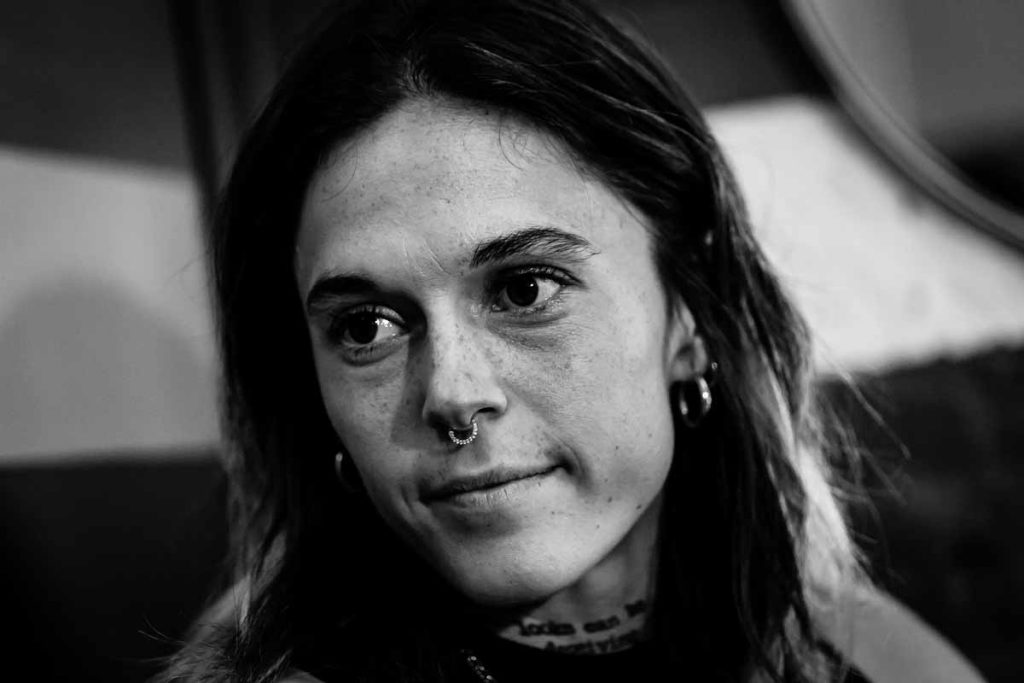
“The second final also hurt a lot, because of all the fans who had come to support us. We felt like we let the people down, we couldn’t give the fans what what we felt they deserved. Any player would want to give fans of her team a victory, but the turnout of Barça fans was so high that we were even more moved [by the loss].”
“How many fans traveled to Turin [for the final]?”
15,000.
“It’s just so incredible. We have the best fans in the world, we feel that way because of how they respond every time we need them, and it’s a source of pride to know that they are always there. Then we felt we had let a lot of people down. Not just because you lose, it felt like the cycle [of Lyon dominance] was coming to an end. It all started with Lyon [in 2019], we were meeting in the UWCL again, it would’ve been magical to be able to win against them a couple of years later in 2021, but it wasn’t to be.”
The injuries, apart from that cervical problem, have been nice to you so far, and we hope that this will continue to be the case. What is the key to your fitness?
“There is a very important part which is the economical advancement, I really believe that. Nowadays you have a lot of tools and a better economy to be able to take good care of yourself, not before. When I was earning 150 euros I could not control what I ate, nor the preparation, nor the [compression] boots that help you recover your legs.”
“Carlos [physiotherapist at Barça] often tells me something that maybe I don’t enjoy myself as much as he does, and that is because I take care of myself. I mean, for example, I don’t like to party. And although it sounds like a little thing, I don’t think it is insignificant when you have two days off instead of partying — which is the most normal thing to do because everybody goes out for a little while, you don’t need to get drunk or anything, but I don’t do it. I don’t like it. I can go out one day if I’m mentally aware that I’m going to go out that day and that I’m going to have to be there, and that I’m going to sleep less. It’s not that I’m obsessed, but for example I don’t like the taste of alcohol very much, and although it seems silly, these are things that make a difference. These are small day-to-day details.”
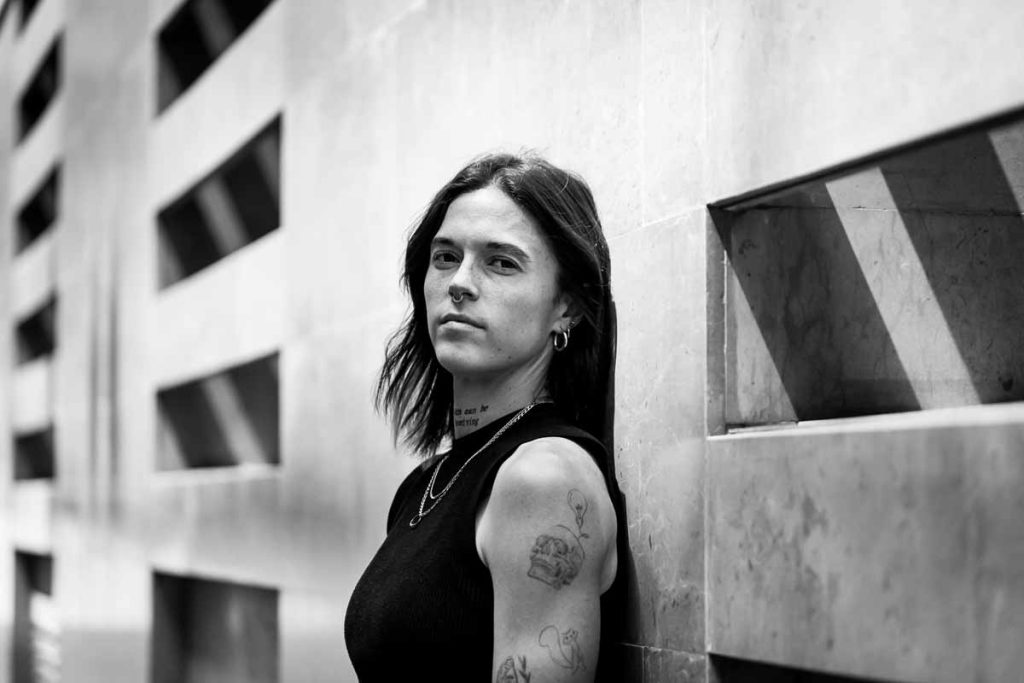
“For example, I have a sweet tooth, and I love food, but if the training has been tough I am aware that during the rest of the day I have to eat well. It doesn’t mean that I am overly cautious at every meal, it means that if I have had a bad dinner, the next day I have to take good care of myself. It’s not that I’m strict, it’s that I try to take care of myself. And if I feel that I have been taking good care of myself for several days and I feel like eating something, I eat it. And if I feel like having some chocolate after dinner, I eat it [but of course, a little bit, I don’t eat a whole bar]”
“That’s my diet, other than that I’m also a very quiet person. I like to be at home, with my cat, or my book, or I watch soccer [and sometimes tennis or golf.] Well, I may be boring but I also like to go out for a coffee or a walk. I’m not a person who has no problem with resting at home, there are people who find it rather stressful.”
“Regarding my muscularity, it is true that I take my vitamins or protein after training if the training has been hard. We follow what our physios & nutritionists tell us, they are always persistent that we don’t lack anything.”
You said months ago in an interview with Maria Tikas that FC Barcelona’s team game is about making music [referring to Tiki Taka] How much does it cost to tune that orchestra week after week [referring how much weekly effort is needed to play the Barça way]?
“We’ll have to ask Jonatan (Giraldez) and all the staff but the playing in Barça’s style is definitely hard. We have spent years at a level in which it has been seen that some players have not succeeded in the club, despite being very good, but for whatever reason they have not fit in — or it has coincided with some injuries.”
New instruments [players] that enter the orchestra [the club] and do not always fit in.
“They may sound great [they may be great players] but maybe the type of music is not the same [the Barça style is different to other clubs.]”
You had to train twice as hard to reach this level, was it worth it?
“Yes, without a doubt. I’m not in the group of captains and I don’t know how this style was incorporated to the utmost level, but we realized after the final against Lyon [in 2019] that we were still far away. I said it at the time, that in that final I felt like I was a youth level player. I was getting hit from all sides and I wasn’t able to react. At that moment you realize that you lack physical strength, experience and knowing how to react to the situation.”
It’s a bit like how your rivals feel while facing you now, no?
“I don’t know how they experience it. It may be similar. What we felt back in the day — when you got the ball back and lost it again; when they were harassing you in your own half: the feeling of anguish and suffocation of not knowing what to do; the feeling that if whenever I give a long ball to my forward there would be two people marking her already — that fear was what you want to make your rival feel, and it is not easy to do. Now we are at a point where we have improved ourselves as a club and we also see improvement in other clubs here in the Spanish league, making it more difficult for us.”
In England they call the Spanish league “farmers’ league”, a competition without appeal because the winner is clear year after year. Do those comments bother you?
“I don’t understand it.”
They say that there are no football players here, that there is one [good] team and the rest are farmers. Is that why they call it that?
“Look, you know what they say about Spain, I get involved because I’m Spanish, but you’re not? Well, don’t speak badly of Spain then.”
“In the end, the Spanish teams have a more favorable record than English team when we face them. But I don’t like to get into trivial arguments, let alone with players or with the English league.”
“I do not understand the need to criticize. Why do you have to criticize a league you’re not in?”
What’s the secret to being competitive so competitive?
“There is no secret, it is of all of us: we always want to win. It’s ambition. I want to win every game, I train a lot for it. There comes a time when you think; I don’t know how much people train, but we train a lot of hours. I came here at 10 o’clock in the morning and I go home late. I know how hard I work and I know what they demand of me in training, and I know that if I don’t reach the desired level, the management will give you extra work before the end of the training session to reach the target. The staff has good player management, individual effort is valued in each training seasion.”
Regarding Alexia’s injury:
“At that moment [when she got injured], the last thing you want to do is overwhelm her. Everyone was going to be very attentive, she was going to have a thousand messages, everyone was going to want to talk to her, and the last thing you want, knowing Ale, is for her to be overwhelmed.”
“I went to her room to see if she needed anything, obviously as a partner. It was a very tough loss for the team, it’s true that it sounds bad and I’ve said it in some interviews, but at the time I thought “man, not Alexia”. But if you know Alexia, you know how much she loves soccer, how much she enjoys playing, how she lives it. She really is very geeky [in football], like our staff I don’t know if she will want to be a coach in the future but she is that kind of football obsessed person who lives it in a different way, 24/7 football. Or at least she used to be like that, now maybe she has changed, because an injury like this makes you value other things much more.”
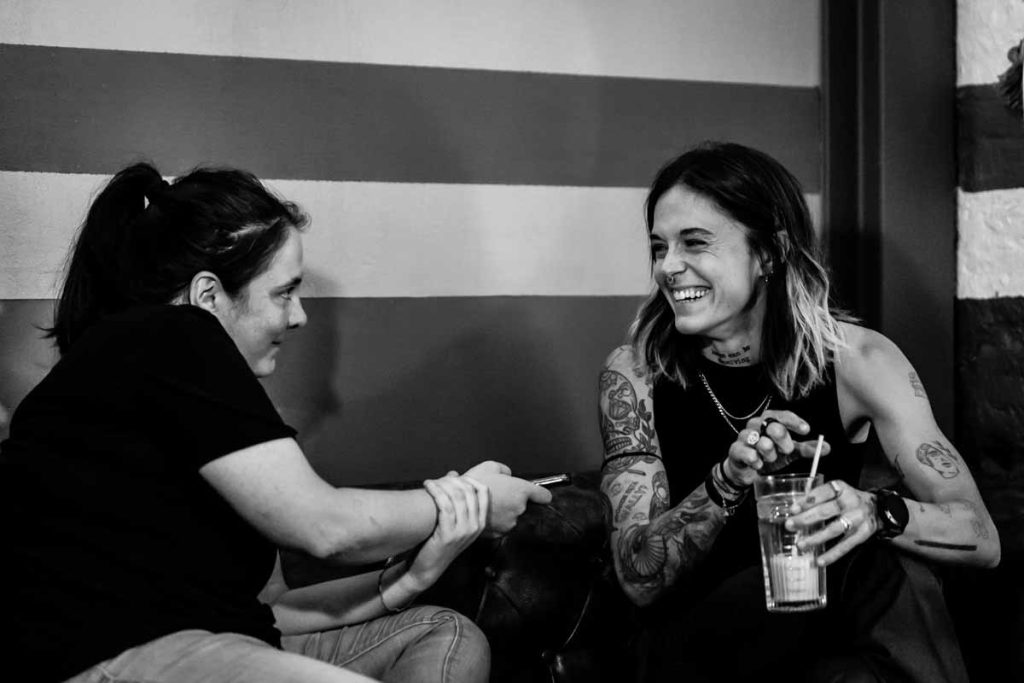
“When you miss what you love the most, you start to value other things much more. The day I got my neck injury was a turning point for me too. The day that you have a different schedule, that you do not coincide with your teammates, that they have a different routine, that you are not in the team, that the team continues training and you are not there and it seems that nobody notices it, because in the end the day to day goes on, and this is how it is, it is the problem of injuries, and when they last so long, people’s lives, their day to day, the competition, go on and you are left alone. They go on without you. And this is what people who have had serious injuries experience. I have not lived through it, but I know how they feel. In the end you are used to the team needing you, to feeling part of a family, and suddenly when you’re not there but the team keeps winning, you stop feeling irreplaceable.”
“At the time it happened, with the national team, it was very hard. And even more so because the National Team is not a team that you train with every day. I train with my teammates every day most of the year, in the national team in a month you have to make people from different teams play the same way, and of course, if you do not do it well in the short time you have, it is difficult to get results.”
“The Real Madrid players don’t press in the same manner as the Barça players, and the same happens with the Levante, Valencia and Athletic players; each team works in a different way. The even have been explained how to defend as a wall in a different way, these are details that mark the way they play. For example, I know where Frido wants the ball, I know where I have to give the ball to Patri or Alexia, I know where Aitana is going to position herself [more or less], and I know where Aitana is probably going to shoot — so that’s why the national team is trickier.”
But you don’t know where to put a ball to Alba Redondo?
“Exactly. I don’t know where she’s going to be more comfortable receiving the ball, where she’s going to give me the clearance, and I’m not talking about Alba, I’m talking in general. At that moment when Alexia got injured, she was a very important player for us, she was the midfield, and for me, being a left back; she was one of the people I passed the ball to the most.”
“Alexia has everything, the security that she transmits on the field, the fact that despite being an inside player she has a lot of goals, she has the mindset of a playmaker AND a goalscorer at the same time. Luckily at Barça, Patri is an all-rounder and has adapted wonderfully to a newposition and has fulfilled the role that Alexia was playing.”
She is not Alexia, but she was a good stopgap solution.
“I had no doubt that Alexia was going to come back. She came from a very high level, it generated doubts of “what if I come back but not like before”, “what if I don’t return to be the Alexia I was”, “what if I get frustrated with myself”, but today we are already seeing things that you say, this is it. I was training the other day when she did one of her own and I thought, holy ****, she’s already back.”
About her personal life: A lot of attention is paid to everything you do, from your hairstyle to your new tattoos and your love life, does it affect you?
“I don’t take it well at all but because I’m a very quiet person, very reserved about my plans. Sometimes I get the feeling that some of the photos I’ve taken are to say “I’ve seen Mapi in this place,” rather than to have a memory with me.”
“I don’t have an idol, have never been a fan so I don’t know what it feels like when you have someone you admire so much in front of you. As far as I recall the only time I have ever asked for a picture was with Messi. One picture, that’s; I wouldn’t want to bother him because he’ll be sick of having his picture taken. I can understand that there are people who feel very passionately about their idols but sometimes it’s hard for me to grasp that with a simple photo I can make someone happy. A photo with Mapi León? cool, but so what? I’m just another human at the end of the day.”
On fans that want to know everything about her:
“Yeah…that’s a bit too far. I think there has to be a line that shouldn’t be crossed. I’ll give you an example: I don’t know if it’s pleasant for you that if someone comes to ask you for a picture, the person next to you is also recording you, and with the cell phone twenty centimeters away from your face.”
“I’m not doing well, thank you. I don’t take it well at all but because I’m a very quiet person, very reserved about my plans and I think there are things I do that I don’t know the impact they have. Sometimes I get the feeling that some of the photos I’ve taken are more to say “I’ve seen Mapi in this place” than to have a memory with me.”
“As I have never had an idol either, I have never been a fan, I don’t know what it feels like when you have someone you admire so much in front of you… I seem to remember that I have only asked for one photo and that was of Messi. Prou. And with one it’s enough, I don’t want to bother either because he’ll be sick of having his picture taken. And I can understand that there are people who do have that desire, but I am not aware that I can generate the same feeling that generates an idol in that aspect. It is something difficult to accept and of which I am not aware. Sometimes it’s hard for me to understand that with a simple photo I can make someone happy. A photo with Mapi León? Yes, but so what, I’m just Mapi León.”
It’s not just about asking for a photo, it’s about wanting to know everything about you.
“Yeah, that’s a bit too much, isn’t it? I think there has to be a point where that’s as far as it goes. I’ll give you an example: I don’t think it’s friendly to have someone recording you when you come up to take a picture.”
“Many times, I have been stopped in the street by people who tell me things like, “thank you, it has been a long time since I enjoyed watching Barça play so much, you are a source of pride.” It’s fans that just want us to know they are there to encourage us, to show their affection who are a boost of energy for me. Knowing that we are doing things well and that the fans back us. We have found affinity with the fans; something that is very difficult to find in women’s soccer, that we haven’t seen before, and we want to give them back everything they give us.”
On her relationship:
“I’m doing fine because it’s very natural. We haven’t confirmed it either, so to speak.”
“I have never said that she [Ingrid Engen] is my girlfriend. You can guess; maybe she’s just my friend.”
Didn’t you confirm it in an interview with some kids [DAZN]?
“No, she [the little kid] asked me who my best friend is on the team, and I told her the truth. All my thoughts and all the things that happen to me, she knows them first. Anyway, I’m doing well, I know that there is a lot of interest in this topic online.”
Engenmapismo.
“What?”
The ‘interest’ is called Engenmapismo.
“Ah, it has a name and everything. I didn’t know that, but this enthusiasm is very common online. People on social media love couples.”
“I live it naturally, as if it were nothing strange, because in fact it is nothing strange, it is the most normal thing in the world. As long as people don’t make up stuff, everything is fine. Sometimes people imagine things or make things up, and they don’t realize that these things can bother you.”
“Sometimes we joke about this, I tell her [Engen] “If we ever break up we won’t be the only two people that are upset.”
On the toxicity on Twitter:
“Twitter is a place where anyone can have twelve different accounts with twelve fake names and can influence the lives of many people, or criticize, or hate. It’s not something I’m very fond of, the concept is very mean.”
“I have my Twitter because I’m a public figure, with my name, my face, and everybody knows who I am. And I get a lot of tweets, for good or bad, from people who don’t even have a picture. It would be nice if this could be regulated and each account could be verified in a real way.”
Do you have the feeling that we have a professional league?
“No, of course not. I think there are a lot of things missing for it to be professional. For example, there are facilities that are not professional. And I understand that it is not easy to find a suitable facility that you can afford, but this is the First Division.”
“I don’t know what it’s like to create a club and experience all the difficulties of creating it, making it grow and maintaining it, but you can’t pretend to play in the first division when you don’t have a club prepared to play in the first division. Being at this level and competing at this level requires a minimum, and the players have to receive a minimum salary because otherwise, they cannot dedicate themselves to the game.”
“It is a cycle, the more resources we have,the better we are and the more we can dedicate ourselves to the team. As a result the team will perform better because collectively, we will play a better game, we will run more, we will be faster, we will generate more problems for the rival: all in all it is better for the spectator.”
“My job is to play football and these are details that I shouldn’t get involved in but people in power who organise things make it [running women’s football] more complicated than it is.”

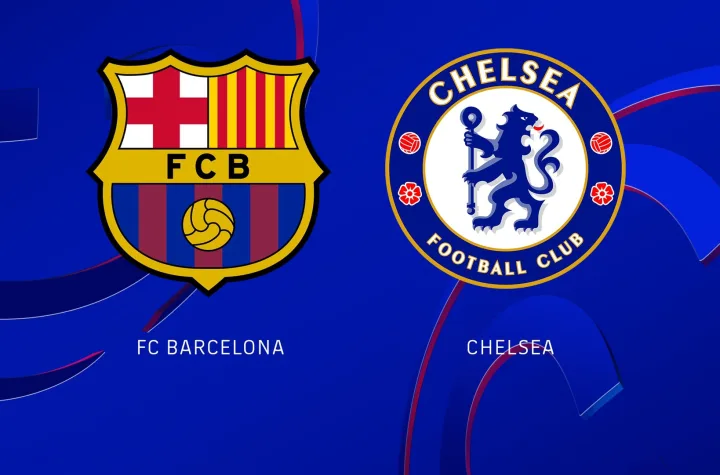
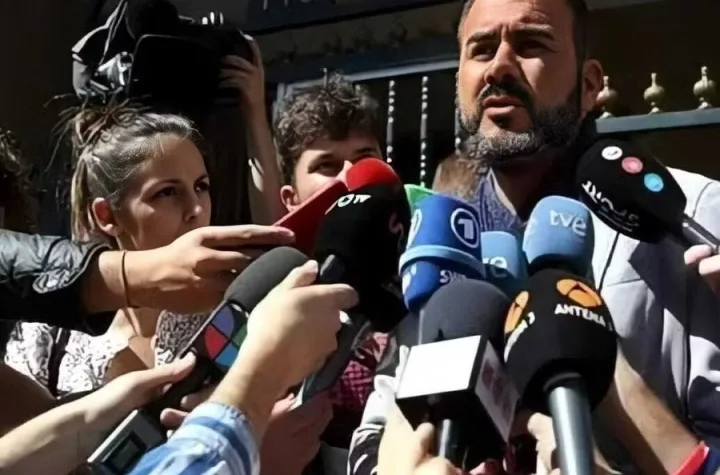
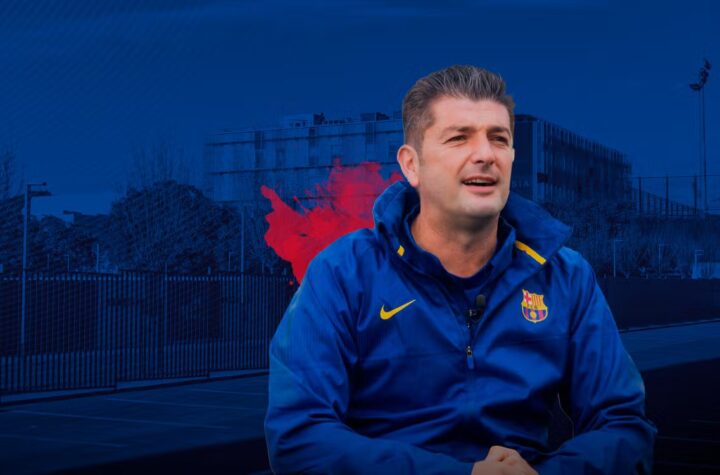
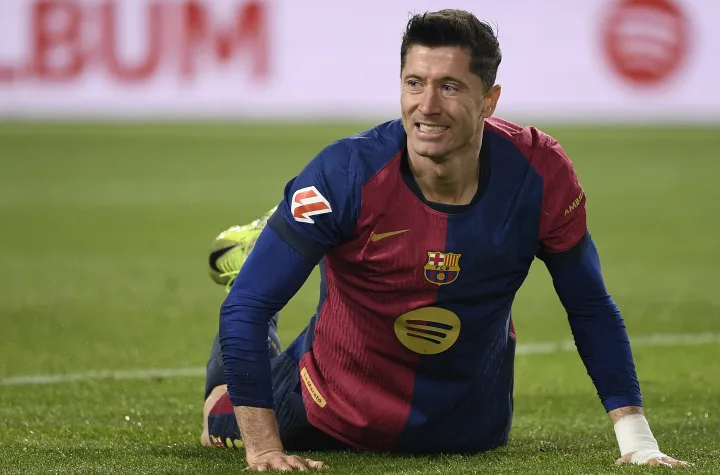
More articles
Clash of Titans: FC Barcelona Femení faces Chelsea FCW again in the Champions League.
Miguel Galán: “Tebas actions with Barça have bad faith bordering on an alleged crime of administrative prevarication”
Franc Artiga: “They’re hiring me because I’ve been at Barça for many years”